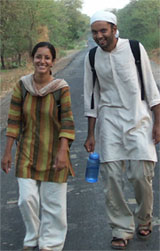Nipun Mehta, Jul 30, 2022 in Sanctuary of the Heart:
Welcoming Strangers
Many years ago, my wife and I went on a walking pilgrimage across India. We were entirely in the hands of strangers -- we would eat whatever food was offered and sleep wherever place was offered; needless to say, that year of our life was a profound experience.
What was perhaps most remarkable was my Mom's (and Dad's) response. Imagine your 20-something-year-old son coming up to you and saying, "I know I just got married six months ago, but both of us feel a call to dive deeper into our spiritual journey. We want to sell everything we own, head to the Gandhi Ashram in India, walk without any security (but a heart of service), transform ourselves and learn to deeply trust in life's emergence. Yeah, on our typical India trips, I wouldn't drink tap water or go out in 120 degree heat, but all bets are off here. There's no destination as such. I don't know when we'll be back, and you won't be able to get in touch with me. But I only want to go if I have your blessings. What do you say?"
For every story of Peace Pilgrim's 28 year walk without money, we also hear about an inspired couple's fatal journey in Tajikistan. Which part of us do we lean into? On one side, we want to be agents of building trust in a polarized world; on the other side, we understand the value of healthy boundaries. Not just that, we also understand that when fear hijacks us, we secretly cover up our fear in the name of boundaries; or when a greedy ambition takes us, we prematurely or performatively override our boundaries in the name of trust. Intellectualism offers no solution. Build trust or boundaries? Am I operating out of fear or greed? Or a little bit of both? How, then, do we decide if we should lean in or stay safe?
 And I often ask myself, what if I was in my mother's shoes? You want to encourage your son, but you don't want him to foolhardy. And far more complex scenarios with his wife of just six months! Deep down, you want to encourage their spiritual pursuit, but you dread that phone call of tragic news. You want to bless with an abundant embrace, but still long for certainty and security. How does one respond?
And I often ask myself, what if I was in my mother's shoes? You want to encourage your son, but you don't want him to foolhardy. And far more complex scenarios with his wife of just six months! Deep down, you want to encourage their spiritual pursuit, but you dread that phone call of tragic news. You want to bless with an abundant embrace, but still long for certainty and security. How does one respond?
Well, my mom's response changed the arc of my life. After initially saying no, then having longer discussions, :) she did say yes. The tipping point was when I told her, "Mom, I want you to go on this pilgrimage with me. But you get to do it while staying here. You remember how you raised us with 'Vasudeva Kutumbhakam' (Sanskrit prayer that means 'the whole world is my family')? Well, if you ever feel like your son is hungry on the other side of the planet, feed a stranger here and know that it will nourish him on the other side of the planet. If you feel like your son doesn't have a place, house someone; if you sense he's not safe, give refuge to another. You've always taught me that when we commit to such a pilgrim heart, boundaries start to dissolve, gratitude and reverence awakens, and gentle whispers of our service inexplicably tilts the world towards greater love. Will you go on the pilgrimage with me?"
With tears in her eyes, she said yes. She blessed me, as did my Dad. At so many specific moments, my mom was especially worried for us -- often weeping silently while sitting in her usual spot on the couch -- and then she would remember our dialogue and serve strangers. Upon returning, many friends narrated some truly beautiful stories of her offerings.
My mom has always been on a path of kingly givers, but when I came back, I told her that *her* pilgrimage was much harder than ours. She taught me about love. I sense her practice melted a part of me that I was a stranger to; and in turn, it allowed me to love others with an even fuller embrace.
If you were holding a loving mother's heart, how would you respond? Have you blessed someone, or been blessed by someone, in a similar way? When you encounter a stranger, what helps you find a skilful response between leaning in with love and staying safe with boundaries? In what way, does that process help you encounter the stranger within you?
For today, soak in some chants by Krishna Dass from his "Pilgrim Heart" album. And consider this 'Pilgrim Practice' by Lacy Clark Ellman:
Before we can truly welcome the stranger, we must first notice and name what is foreign. To do so, notice your feelings of discomfort. This might simply arise as a feeling of unfamiliarity, offering a gentle nudge to practice hospitality. Or, it could manifest more strongly as a feeling of being threatened. Instead of being put off by such powerful emotions, welcome them as a guide as Rumi encourages, trusting that feelings of discomfort are invitations to journey further. “[The pilgrim is] a stranger to the companions she meets along the way, a stranger to the places visited, and a stranger to the inward journey of meaning and transformation.” This inward stranger is just as important as the outward stranger in a foreign land when it comes to pilgrimage. In order to make room for such transformation, however, the pilgrim must learn to welcome what is foreign or strange with open arms, whether that is the culture that surrounds them on their travel experiences, the circumstances in which they find themselves in everyday life, or the unfamiliar emotions that rise up from within.
